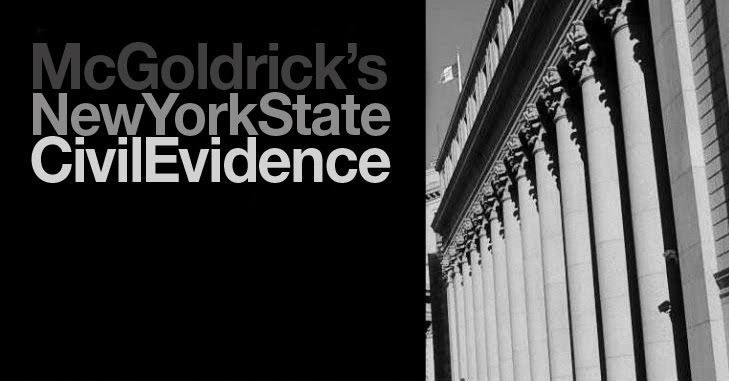In Kwiecinski v Chung Hwang 2009 NY Slip Op 06630 defendant medical practitioners and medical group sought to amend their answer and prevent plaintiff from using an admission made by the defendants in their answer. That motion to amend was granted by the trial court and it was further ordered that the plaintiff was precluded from further use of the admission. On appeal, plaintiff successfully sought reversal of the order precluding her use of the earlier admission in the original answer.
Plaintiff had commenced the action seeking damages for professional negligence of defendants in failing to give the proper medication prior to surgery, including this allegation in her pleading:
"was supposed to receive Versed prior to the surgery. Instead, due to negligence, gross negligence and recklessness of defendant[s], plaintiff was given a paralytic agent.
Defendants seemingly made an admission against interest in their answer, in their motion to seek to amend it:
"as to the allegations as contained in paragraph numbered '23' of the . . . [c]omplaint, admit the first two sentences and deny knowledge or information sufficient to form a belief as to the remaining allegations." Defendants thereafter moved for permission to amend their answer, claiming that the admission of the facts contained in the first two sentences of paragraph 23 of plaintiff's complaint was inadvertent, and for an order precluding plaintiff from using the original admission in further proceedings in this action. Supreme Court granted the motion to amend the answer and ordered that plaintiff or any other party may not use the admission in the original answer at any stage of the litigation.
Third Department held:
Plaintiff contends that Supreme Court erred in precluding the use of defendants' admission in their original answer. We agree. "An admission of fact in an original pleading does not lose its effect as an admission of fact because the pleading has been superceded as such by an amended pleading" (Ranken v Probey, 136 App Div 134, 135 [1909]; see Resseguie v Adams, 55 AD2d 698, 699 [1976], affd sub nom. Locator-Map, Inc. v Adams, 42 NY2d 1022 [1977]; Ogilvie v City of New York, 44 AD2d 586, 586 [1974]; Arinsky v Arsinskiy, 280 App Div 820, 820 [1952]; Polakoff v Hill, 261 App Div 777, 780 [1941]; McNulty v Zaganos, 255 App Div 274, 275 [1938]; Jarnvagsstyrelsen v Dexter & Carpenter, Inc., 32 F2d 195, 198 [2d Cir 1932], cert denied 280 US 579 [1929]). As a result, admissions in an original pleading superceded by an amended pleading "are still evidence of the facts admitted" (Resseguie v Adams, 55 AD2d at 699). The circumstances surrounding the original admissions and the amendment may be explained at trial, however, and the weight afforded the original admissions is to be determined by the factfinder (see Bogoni v Friedlander, 197 AD2d 281, 292-293 [1994]; Arinsky v Arsinskiy, 280 App Div at 820). As the admissions in the original answer survive the amended answer (see Arinsky v Arsinskiy, 280 App Div at 820), we conclude that Supreme Court erred in precluding defendants' admissions in their original answer.
skip to main |
skip to sidebar



About The Author
- Gregory McGoldrick, Esq.
- Gregory McGoldrick, Esq., of the New York State Bar.
Since 2009, McGoldrick's New York State Civil Evidence, The Original New York Evidence Resource For Civil Practice Counsel - Straight To Your Android, BlackBerry or iPhone.
Table of Contents
- "human factor" standard
- "legally sufficient" evidence standard
- "utterly irrational" standard
- 1st Dept
- 2nd Dept
- 3rd Dept
- administrative proceeding
- admission in deposition testimony
- admission in former pleading
- admission in pleadings
- admissions against interest
- adverse inference limitation
- affidavit contrary to deposition testimony
- affidavit of service
- App Term 1st Dept
- appeal of directed verdict
- appeal of trial court's discretion
- burden of proof
- business records exception
- child support
- contempt
- contract of insurance
- cooperation clause
- Court of Appeals
- CPLR 2106
- CPLR 3101
- CPLR 3211
- CPLR 3212
- CPLR 4506
- CPLR 4506(1)
- CPLR 4513
- CPLR 4518
- CPLR 4518(a)
- CPLR 503(a)
- CPLR 5501
- criminal conviction
- damages based on probability
- Domestic Relations Law 245
- eavesdropping
- Education Law 6512
- email transmission
- exception to rule against hearsay
- excited utterance
- existence of liability insurance
- expert opinion based on independent report
- expert testimony
- expert witness
- felon witness
- former testimony
- foundation
- FRE 801(d)(2)(B)
- government agency guidelines
- hearing on service
- husband and wife
- implied revocation of authority
- incidental admission
- inconsistent facts
- inconsistent facts in expert testimony
- industry standards
- informal admission
- Insurance Law 5102(d)
- insured's statement to insurer
- intercepted communication
- judicial admission
- Judiciary Law 756
- medical expert
- medical records
- negligence
- negligent design
- New York State CPLR Civil Evidence Resource
- non mandatory guidelines
- Notice of Claim
- notice of condition
- official documents
- oral testimony in support of written Notice of Claim
- particularity
- Penal Law 156.10
- Penal Law 250.05
- photographs
- pleadings
- police accident report
- preclusion of expert witness
- present sense impression
- prevailing standards
- prima facie case of negligence
- prior conviction on plea
- prior notice of condition
- professional reliability exception
- proof of service
- qualification of expert witness
- qualification of expert witness\
- rebuttal of proof of service
- redaction of hospital records
- relevance of conviction to issue
- remoteness of time
- res ipsa loquitur
- retraction of admission
- rule against hearsay
- Section 50-H Examination of Claim
- Section 50-H General Municipal Law
- self-authentication
- serious injury
- spoliation of evidence
- stored communication
- summary judgment
- terms of request made of witness
- triable issue of fact
- unsworn expert evidence
Disclaimer
The information in this site is published as an interim point of reference for civil litigation counsel in the state of New York. There is nothing in this site that should be taken by you to be legal advice. Accessing or reading the information in this site does not create an attorney-client relationship between you and the author.
Return to McGoldrick's New York Civil Evidence
Since 2009, The Original New York Evidence, Disclosure & E-Discovery, and Deposition Practice Resource for Civil Practice Counsel - Straight To Your Android, BlackBerry, iPhone or iPad.
Since 2009, The Original New York Evidence, Disclosure & E-Discovery, and Deposition Practice Resource for Civil Practice Counsel - Straight To Your Android, BlackBerry, iPhone or iPad.
